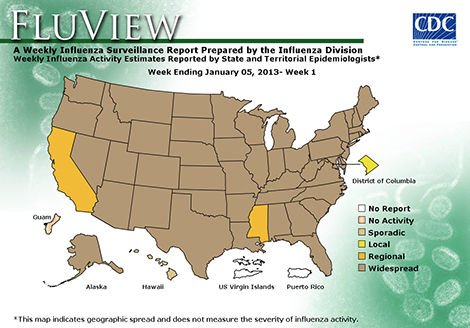
The New Hampshire Department of Health and Human Services (DHHS) reports that this year’s flu season is early and widespread compared to last year. Since December there have been 40 flu outbreaks, mostly in nursing homes and long-term care facilities, which is unusually high for this time of year.
In our area, the Convenience Care at Lakes Region General Hospital reports that a third of its patients are coming in complaining of flu-like symptoms.
At AE/MS, School Nurse Christine Frost reports, “In October, AE/MS, with the assistance of the Caring Community Network of the Twin Rivers, held a school-based flu clinic for students in which 30% of our student body was immunized against influenza.
“Over the last two months, we have had only two or three cases of what would be considered Influenza-Like Illness (ILI): fever above 100 degrees, cough, and/or sore throat. To my knowledge, there have been no confirmed cases of influenza at AE/MS.
“It is our policy at AE/MS to track all absences due to illness. AE/MS, along with many other New Hampshire schools, take part in influenza surveillance by reporting daily to DHHS the total number of absences and those absences due to flu-like symptoms.”
At MVHS, Principal Mike Jette reports, “We have a few cases of students with flu-like symptoms, but nothing that stands out as unusual. We stress the importance of getting the flu shot, and we routinely announce dates and locations of clinics in our area. We also stress good hygiene and health, including washing hands and desks, eating healthy foods, and getting rest.
“Parents can help by informing us if a child is home sick with flu-like symptoms. We do track that information, but it is not always shared with us when a parent calls in for a sick child.”
And at Proctor Academy, Communications Director Chuck Will reports:
“As a predominantly residential community, Proctor has to lean on preventative strategies: flu shots. We asked the parents of all students under the age of 18 for permission to inoculate, and we dedicated blocks of time for whole athletic teams or advisory groups to attend health fairs at which free flu shots were administered. More than 250 students received flu shots at school; others report having been vaccinated while at home.
“At the present moment, we have no incidence of diagnosed influenza within the student population. Several adults have been diagnosed with flu, but the number remains small.”
Advice And Info From DHHS
DHHS is encouraging anyone six months of age or older who has not yet received this year’s flu vaccine to get vaccinated – it’s not too late. This year’s vaccine is a good match to the strains of flu that are circulating so far, and there is still plenty of vaccine available.
“The amount of illness we are seeing here in New Hampshire,” said New Hampshire Public Health Director Dr. Jose Montero, “is not yet to the point of alarming. However, it is cause for serious concern, especially since we have now seen 14 influenza-related deaths so far this season, which is unusually high for this early in the season.
‘It’s important for people to remember to take steps to prevent becoming ill. Most important is vaccination. It can take up to two weeks for your immune system to fully respond to the vaccine, so it’s important to get the shot or nasal version of the vaccine as soon as possible.”
DHHS also encourages all employees, staff, and students that have flu-like symptoms to remain home for at least 24 hours after the fever breaks. At that point, a person is typically but not always no longer infectious.
Influenza can be a serious disease of the lungs, nose, and throat. The illness is spread from person to person through coughing and sneezing. Typical flu symptoms include fever, headache, extreme tiredness, dry cough, sore throat, runny or stuffy nose, and muscle aches. An average of 25,000 people die each year in the United States due to influenza.
For more information on influenza and the vaccine, contact the New Hampshire Immunization Program at 800-852-3345 ext. 4482 or 271-4482; or the Communicable Disease Surveillance Section at 800-852-3345 ext. 0279 or 271-0279. Visit the Centers for Disease Control and Prevention (CDC) Web site at CDC.gov for more information or the DHHS Web site at www.DHHS.NH.gov.
To get the flu vaccine, contact your healthcare provider or visit a local pharmacy.